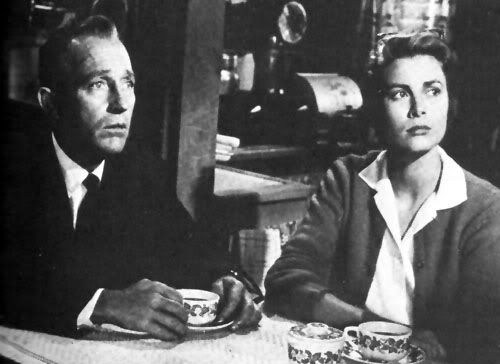
The #4 selection in our parade of Oscar injustices may not be a popular one, and it's not a choice that reflects on the ineptitude of the performance; rather for the performance that was not awarded that year. The year was 1954. The winner: Grace Kelly in The Country Girl. Kelly was at the beginning of her brief, meteoric career in Hollywood, before she gave it all up to become Princess Grace of Monaco. She quickly ascended to the Hollywood "A-list" to become the co-star of such major stars as Clark Gable (Mogambo) and Gary Cooper (High Noon), among others. 1954 also marked the year of the comeback of Hollywood's most troubled, yet greatly beloved star, Judy Garland, in the first film remake of the perennial A Star Is Born (version #4 is currently in the works, to star Beyonce...uh huh). Garland had had a much publicized crack-up, having been fired by MGM, had several suicide attempts, stays in mental institutions, etc. As everyone knows, we all love a good comeback, and Garland (and her then-husband, Sid Luft) pulled out all the stops to ensure that her comeback would be a success. Warner Brothers produced a lavish, color, wide-screen, big budget musical extravaganza that was the perfect showcase for Garland's many talents.

And dazzlingly brilliant she was. Not only her musical numbers, but her many wide-ranging dramatic scenes reveal her to be a truly great actress, delivering one of the most unforgettably vivid performances in cinema history. But at 196 minutes, A Star is Born was far too long for Warners' liking--following the bottom line that at that length, the number of times they could show it per day was reduced; thus, it was randomly and viciously slashed to a more fiscally palatable 154 minutes, rendering the film choppy, hard to follow and confusing (what's more, most of the cut footage was destroyed!). And these cuts happened while the film was already in wide release, which left audiences feeling "gypped". It was one of the biggest mistakes Warner Brothers ever made. But when the film was originally released, in its full length, Judy Garland was considered a shoo-in--and a much-deserved one, too--for the Best Actress Oscar.

The Country Girl was the filmed version of the Clifford Odets' Broadway hit, and starred Bing Crosby, as the washed-up, alcoholic singer/actor (in a subtle, effective performance). And in a bit of off-beat casting, they cast the gorgeous, glamourous Grace Kelly as his bitter, frumpish wife. Her performance was just fine--and it wasn't her fault that she was far too young to play this role. There's nothing embarassing about her performance, though one is left to wonder how much more effectively the part might have been played by an actress of a bit more "depth"--not to mention, age-appropriateness (Bette Davis, perhaps?).

So, it's Oscar night. Judy Garland is not in attendance, as she is in Cedars of Lebanon hospital in Los Angeles, having just given birth to her only son, Joey. But her "lock" on the Best Actress category was so assured, the producers of the Academy Awards that year actually set up scaffolding outside the window of Garland's hospital room, in order to beam her acceptance speech, via remote, to the worldwide television audience (the show was televised for the first time only the year before). Garland later recalled that when Kelly's name was announced as the winner, the television crew silently began dismantling their lights and scaffolding and wordlessly scurried out of her hospital room. A heartbreaking scenario, to say the least.

There was a huge hue and cry in Hollywood (and beyond) over the injustice of the Academy's choice. Groucho Marx famously quipped that it was the "greatest robbery since Brink's". It became clear that it was something of a voter revolt against Warner Brothers for their greedy mutilation of a brilliant film, for A Star is Born was completely shut out of any major awards, receiving only one award, period: For Best Original Musical Score. George Cukor's flawless direction and Moss Hart's magnificent script (which stands up against any script of any year), weren't even nominated--nor was the film itself. And furthermore--in what was perhaps more a matter of "bad timing," James Mason (who was nominated) lost the Best Actor award to Marlon Brando's deserving performance in On the Waterfront--though I still feel Mason's heartbreaking, multi-layered portrayal of the lost Norman Maine should have won).

Painstaking efforts to try to track down the excised footage from the original version of the 1954 A Star is Born have been underway for decades, and scenes and snippets continue to turn up. But the version that is most commonly shown and is available on DVD is sort of a mutilated beauty; a shadow of what Cukor and Hart's vision must have been, with scenes recreated using still photographs. It's sad to see this glimpse of "what might have been," it's all we've got (for now?).
Grace Kelly's victory that year is generally considered by most Oscar historians to be one of the greatest injustices in the history of the Oscars. It's one in a long line of performances that were deemed Oscar-worthy, by glamourgirl actresses who won the award for taking off their makeup (Jane Wyman for Johnny Belinda; Sophia Loren, Two Women; Charlize Theron for Monster, to name a few) . Principality of Monaco:
You MUST give back that Oscar! Send it to Liza, or something Here is, perhaps, Judy Garland's finest scene in this very fine film. And, incredibly, this is one of the scenes that the hatchet-men at Warner Brothers deemed unnecessary and cut from the final print. Fortunately, it somehow escaped being destroyed, as so many others ultimately were.
See also:
No comments:
Post a Comment